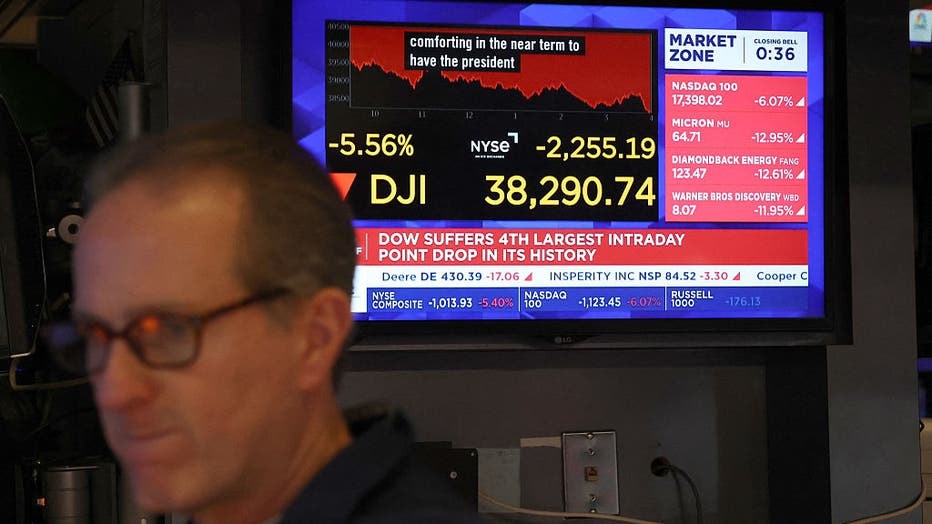Should you sell your stocks now? What to know amid Trump tariffs and market turmoil
How can you prepare for the impacts of tariffs?
The stock market suffered massive losses on Thursday, just one day after President Donald Trump unveiled his newest set of tariffs. The S&P 500 dropped 4.8% for its worst day since the pandemic crashed the economy in 2020. The Dow Jones Industrial Average slid 1,679 points, or 4%, and the Nasdaq composite tumbled 6%. LiveNOW's Josh Breslow spoke about how you can prepare for the impacts of President Trump's tariffs with Mark Hamrick, Senior Economic Analyst and Washington Bureau Chief for Bankrate.
LOS ANGELES - With stocks tumbling and economic uncertainty rising, many investors are questioning whether to pull their money out of the market. But financial experts and historical data suggest that bailing out now could do more harm than good.
A new Associated Press report highlights that while the recent downturn feels jarring, market declines of this magnitude are not uncommon. Staying the course—especially with a diversified portfolio—has long been a proven strategy, particularly for investors with time on their side.
Why are stocks falling so fast?
The backstory:
The S&P 500 is down more than 16% since peaking in February, largely due to fears surrounding new tariffs announced by President Donald Trump.
Investors had hoped the tariffs were a bargaining chip, but their severity—unleashed on "Liberation Day"—rattled markets and raised concerns about long-term damage to consumer confidence and corporate growth.
RELATED: Stock market today: Dow and S&P 500 continue decline amid Trump tariffs: live updates
These types of downturns aren’t new. Historically, the S&P 500 experiences 10% corrections regularly, often as a way to cool overheated optimism. But this recent drop comes on the heels of two straight years of 20%+ market gains, making the reversal feel even more dramatic.
Should you sell now to avoid deeper losses?
What you can do:
The instinct to sell during a downturn is common—but often misguided. Selling locks in losses and removes the opportunity to recover when markets rebound. And while past performance doesn’t guarantee future returns, the S&P 500 has recovered from every major crash, including the Great Depression and the 2020 pandemic.
Experts suggest only investing money in the stock market that you can leave untouched for several years. "Data has shown, historically, that no one can time the market," Odysseas Papadimitriou, CEO of WalletHub, told the AP.
How should you adjust your investments?
Why you should care:
Recent years of strong U.S. stock performance have left some investors overexposed to a handful of big tech stocks or domestic companies. Experts recommend rebalancing toward sectors that are more resilient to trade disruptions, such as utilities, health care, and consumer staples.

A trader works on the floor of the New York Stock Exchange April 4, 2025, in New York. (Photo by TIMOTHY A. CLARY/AFP via Getty Images)
"Those moments should pass," said Brian Jacobsen of Annex Wealth Management. "A diversified strategy that is thoughtfully adapting to changing circumstances can’t prevent the punches, but it can help soften the blows."
Phil Battin, CEO of Ambassador Wealth Management, advised investors to ensure their portfolios are balanced across sectors and regions to minimize risk.
What should new investors keep in mind?
Big picture view:
The rise of trading apps and investing tools has introduced millions of young investors to the market—but many are now facing their first real downturn. The good news, according to experts, is that time is on their side.
"Now is not the time to make emotional decisions," said Stephen Kates of Bankrate. "Investors with ample time to stay invested should remember how lucrative patience has been over the last 15 years."
RELATED: Stocks tumble as Trump’s tariffs roil global markets
Reassessing goals and working with a trusted financial advisor can help create a steady plan for weathering volatility without making rash moves.
How can retirees protect their savings?
Local perspective:
Older investors have less room for error, especially those already withdrawing funds for living expenses. But even retirees should maintain some exposure to stocks, especially in the early years of retirement, to ensure their money lasts through decades of potential spending.
Niladri "Neel" Mukherjee of TIAA Wealth Management said retirees may need to reduce spending after a downturn and work closely with advisers to adapt their drawdown strategy.
"You may want to slow that down and pick that back up once the market recovers," Mukherjee told the AP.
Is there any way to know when this ends?
What's next:
Market experts agree on one thing: no one can predict when a downturn will end or when the next rebound will begin. That’s why strategies rooted in long-term planning and discipline tend to outperform efforts to time the market.
In the meantime, investors are urged to focus less on daily headlines and more on overall strategy, risk tolerance, and financial goals.
The Source: This article is based on reporting by the Associated Press. Additional context was drawn from previous FOX Television Stations and FOX Business coverage of the recent market crash, including President Donald Trump’s tariff announcements, China’s retaliatory measures, and statements from Federal Reserve Chair Jerome Powell. Market data, reactions from global investors, and commentary from financial leaders were cited from both AP and FOX Business reporting throughout the week. This story was reported from Los Angeles.

